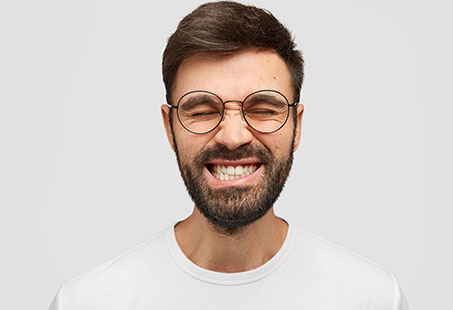Bruxism is an abnormal movement disorder which is typically characterised by the clenching and/or grinding of teeth.
However, it doesn’t always involve tooth contact. That’s because bracing (holding rigidly) and thrusting (moving forcibly) of the lower jaw are also considered a part of it.
The problem is that this habit can be unconscious, so you might not even realise that you’re doing it (while you’re doing it). Although, the squeaking and crunching sounds might very well be noticed by the people around you.
Unfortunately, it isn’t just an annoying habit. Bruxism can have serious consequences for your oral health. And because of how it happens, the pain can even radiate to other parts of your body. So, it’s important that you’re aware of it.
What Is Bruxism (Teeth Grinding)?
Typically, clenching, grinding, and gnashing of the teeth are referred to as bruxism (pronounced bruk-si-zum). However, the new definition also includes bracing and thrusting of the lower jaw (mandible).
While it’s usually considered a sleep-related movement disorder, according to research published in the Frontiers of Neurology, it’s more of a behaviour that may cause harm. But, it can be harmless in healthy individuals.
So, just having bruxism alone might not mean that you need treatment. However, its consequences or risks probably would.
Here, it should also be noted that bruxism isn’t always a standalone condition. It has been linked to other health conditions as well, such as:
- Gastroesophageal reflux disease (GERD)
- Temporomandibular joint disorder (TMJ)
- Obstructive sleep apnea (OSA)
- Multiple sclerosis (MS)
- Attention deficit hyperactivity disorder (ADHD)
- Epilepsy
- Autism
- Dementia
- Parkinson’s
It’s also possible for a “bruxist” to have other repetitive behaviours involving oral structures (parafunctional habits), such as lip biting, cheek chewing, or nail biting.
As far as the prevalence rate is concerned, bruxism can be considered somewhat common. According to a study published in Systematic Reviews, it affects 31% of adults.
But it can affect children as well. In fact, a 2021 research published in the International Journal of Environmental Research and Public Health found that 13% to 49% of children might be affected by it.
Keep in mind that bruxism doesn’t always cause problems. But this mainly comes down to the force of the pressure.
In such cases, treatments help, but, in general, the prevalence of bruxism decreases with age. It may naturally diminish with age without you ever needing any intervention.
What Are The Symptoms Of Bruxism?
You may experience the following bruxism symptoms:
- Worn-down teeth (which can lead to cavities)
- Loss of tooth surface
- Loose teeth
- Cracked/fractured teeth
- Pain in ears, jaw, and neck
- Headaches
- Painful and hypersensitive teeth
- Sore and tired jaw muscles
- Enlarged masseter muscles
- Loss of alveolar bone
- Gum recession
- Jaw misalignment (which can change how your face looks)
- Sleep problems
- Indentations on the tongue
- Fractured restorations (like dental crowns) and implant failure.
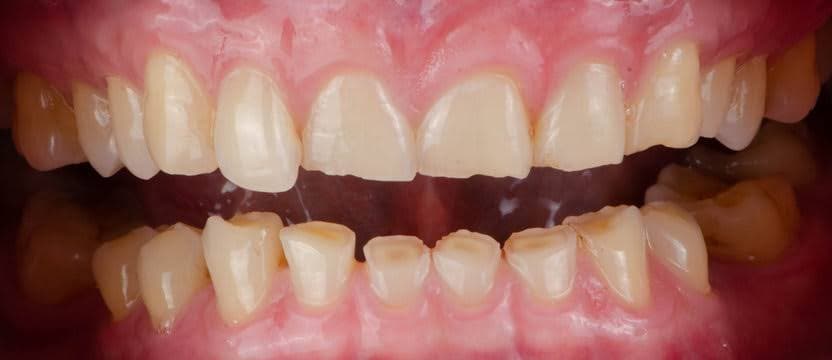
What Are The Types Of Bruxism?
Depending on your sleep and wakefulness, there are two types of bruxisms: awake (or diurnal) and sleep (or nocturnal) bruxism.
The awake bruxism is more common than the sleep one. According to The Journal of Indian Prosthodontic Society, 20% of adults are affected by awake bruxism and 8%-16% of them by sleep bruxism.
However, there are other differences between the two besides the state of your consciousness.
Sleep Bruxism (Teeth Grinding)
Sleep bruxism refers to the rhythmic or non-rhythmic activity of the muscles of mastication (those involved in chewing food).
As the name suggests, it’s something that people do when they’re sleeping; it could be during the day or night. But this teeth grinding in sleep isn’t a continuous activity.
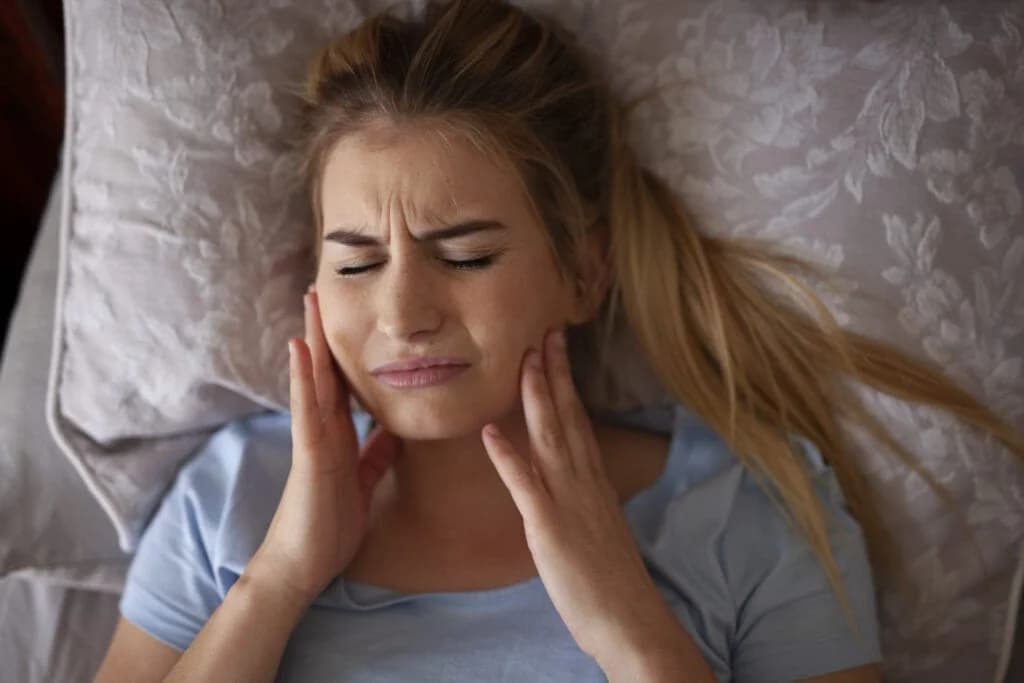
In fact, sleep bruxism happens in very short episodes that last for as long as a second. However, according to Sleep Foundation, you may have up to 100 such episodes. But it’s not necessary that you’ll experience this every time you fall asleep.
However, the force with which a person can grind their teeth while sleeping is rather alarming. MSD Manual reports that the force used to grind teeth while sleeping can be up to 250 pounds (≈ 114 kg).
Research has identified different risk factors for sleep bruxism, including:
- Anxiety and stress
- Sleep disorders
- Smoking and tobacco use
- Alcohol and caffeine intake
- Poor sleep hygiene
This type of bruxism is the most common in children, but it’s been observed that it goes away as they grow older. So, you might not need any treatment for it.
Awake Bruxism (Teeth Grinding)
Awake bruxism involves the activity of the muscles of mastication while you’re awake. You may gnash your teeth against each other or abnormally move your lower jaw in this.
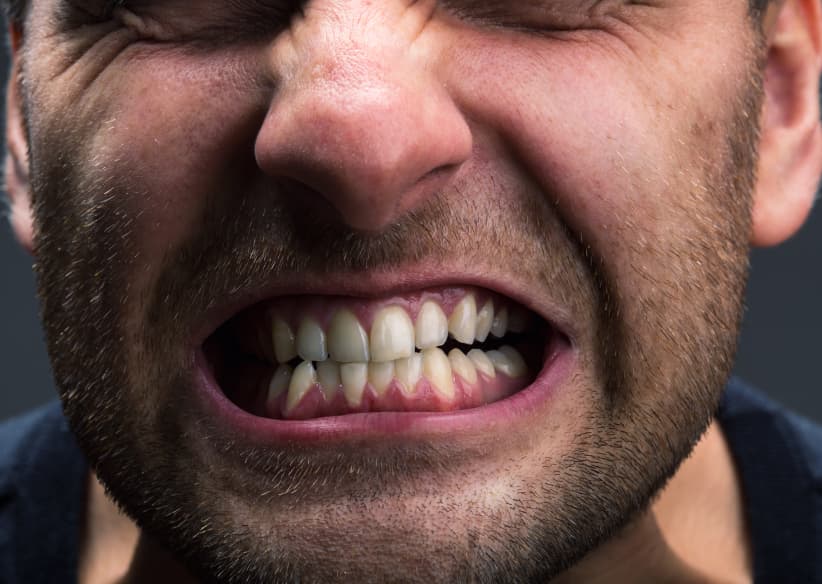
This type of bruxism isn’t considered entirely “unconscious” since you are awake. Instead, it’s considered “semivoluntary” by a review published in The Journal of Indian Prosthodontic Society.
And the researchers also note its association with stress that can come from a person’s professional or personal life. Awake bruxism tends to be more common in women.
What Causes Bruxism (Teeth Grinding)?
Stress and/or anxiety are some of the most common bruxism causes. However, this condition may be linked to other factors, such as:
- Genetics – Your genetics may influence your teeth-grinding habit because some evidence suggests it runs in families.
- Medication – A study published in the Journal of Oral Rehabilitation identified several anticonvulsants, phenethylamines (central nervous system stimulants), selective serotonin reuptake inhibitors (SSRIs), addictive substances (heroin, MDMA, nicotine, alcohol, etc.), among other substances that can cause or worsen a pre-existing teeth grinding problem.
- Personality – Anxiety, neuroticism, and extraversion are some of the personality traits that research shows might be linked to bruxism.
- Health disorders – As mentioned above, bruxism has been linked to health problems like Parkinson’s, dementia, sleep apnea, Meige syndrome, Rett syndrome, and night terrors, among others.
- Occlusion – Problems in the contact between teeth (malocclusion) are also believed to be a cause of bruxism. Inversely, bruxism itself is also believed to cause malocclusion.
Therefore, there are multiple factors that can be responsible for this condition.
How To Diagnose Bruxism?
There are three things which may be involved in the diagnosis of bruxism:
- Self-reported habit of teeth grinding
- Physical examination to check for signs of bruxism
- Polysomnography (sleep study) to check the activity of your masticatory muscles
Maybe you weren’t even aware of this problem until someone pointed it out to you. However, once you’ve realised you might be a bruxist, it’s a good idea to keep an eye out on your teeth-grinding behaviour (especially when you engage in it).
And when doing your clinical exam, your dentist will look at the condition of your teeth to check for signs of bruxism (e.g., worn out, flat surfaces). They’ll also ask for your medical history about any pain or other symptoms you might’ve been experiencing.
Lastly, polysomnography may be done to check for the activity of your muscles while sleeping.
Of course, this is a more reliable diagnostic test than self-reporting. And if you have awake bruxism, electromyography (EMG) may be done to check the activity of your muscles.
How To Treat Bruxism?
Bruxism treatment will depend on the underlying cause of the problem. It could involve the use of occlusal devices, therapy, and medicine. Let’s take a closer look at each:
Occlusal Splints
The dental appliance that often comes up in teeth grinding treatment is an occlusal splint. It’s a type of custom-made mouth guard for teeth-grinding.
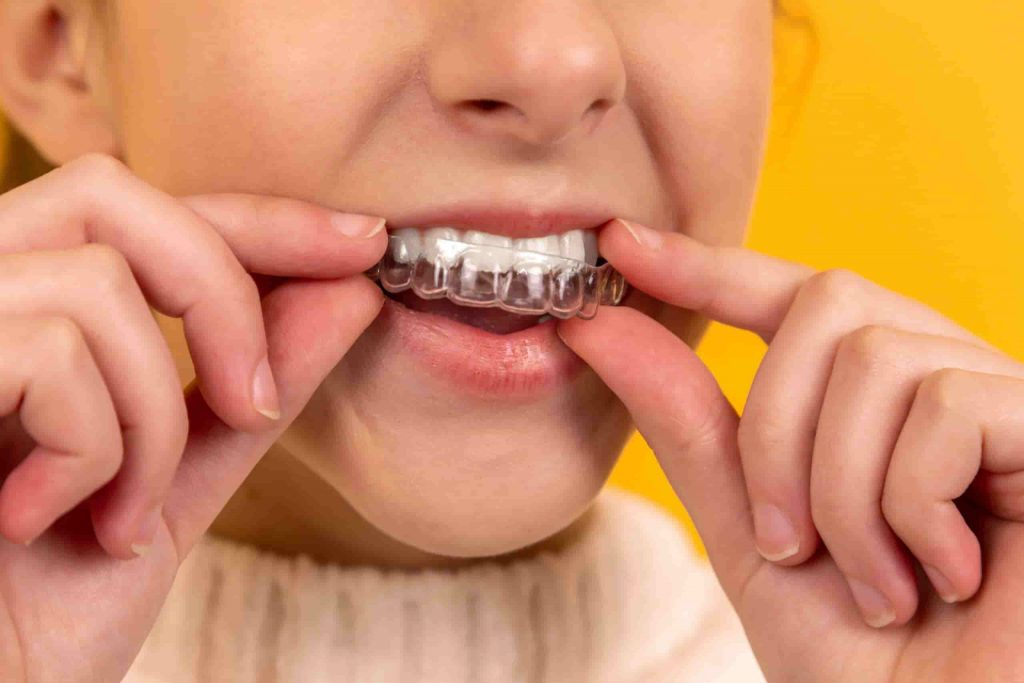
They essentially act as barriers between your upper and lower teeth, protecting them from wear and tear. In general, research suggests that hard splints are better than soft ones to deter a bruxist. Moreover, a hard splint is easier to adjust than a softer one.
By wearing this, you can protect your teeth from getting damaged while you’re inadvertently gnashing them.
Psychological Therapy
Since stress is most commonly associated with bruxism, it might help you to better manage it through different psychological interventions. So, these bruxism treatments can include:
- Cognitive-behavioural treatment (CBT) – focuses on changing your thinking and behaviours, which can help with stress and anxiety.
- Muscle relaxation – the muscles are tensed and relaxed as a way of lowering tension.
- Biofeedback – by teaching you how to control your body functions, it can help you relax your muscles.
To better manage your stress, you can also consider other relaxation techniques, such as meditation, yoga, deep breathing, massages, tai chi, etc.
Physical Therapy
You may also be recommended physical therapy to deal with the physical symptoms of bruxism.
Although a 2018 review published in the Journal of Manipulative & Physiological Therapeutics analysed different physical therapies used for bruxism, including acupuncture, massage, CBT, electrotherapeutic, muscle relaxation, postural awareness, etc.
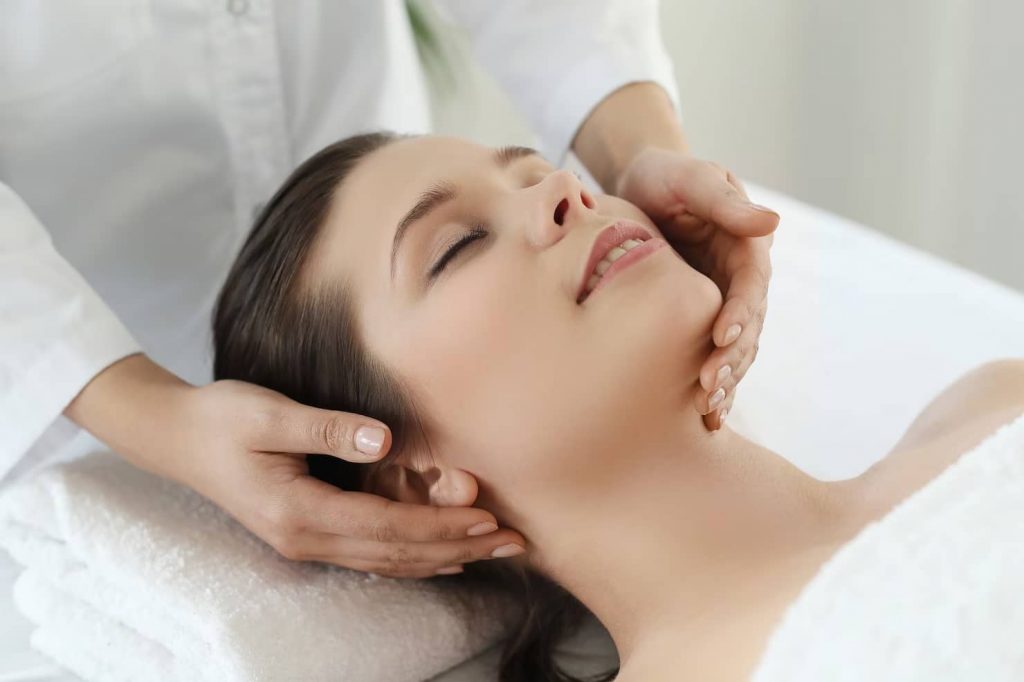
And the researchers found that the quality of the studies done on this was quite poor. Therefore, you can’t be sure that physical therapy will actually help you with stress, anxiety, pain, TMD, etc.
Improve Sleep Hygiene
Your doctor may also recommend you improve your “sleep hygiene.” This means that you need to do and avoid some things before you go to bed.
This will include avoiding caffeine and/or alcohol consumption. You’ll also be advised to not smoke as nicotine is a stimulant (that may worsen or induce bruxism).
You should also consider making your space more comfortable and avoid turning on any bright lights so you’re relaxed.
Botox
It’s possible that you may be injected Botox for your treatment for bruxism.
Some research reports that Botox for bruxism is safe and effective. A few units of it may be injected into your masseter and temporal muscles.
Once injected, Botox won’t allow chemical signals from nerves to contract these muscles. Therefore, it may help with bruxism as well.
How To Stop Grinding Teeth?
To stop grinding teeth due to bruxism, it’s important to be aware of this problem in the first place. Following that, depending on its severity, your doctor might prepare a treatment for you.
As mentioned above, it can include medications or the use of different therapies to help you cope with your problem.
If an underlying health problem or the side effect of a drug is the problem, they’ll focus on addressing these in different ways.
Similarly, if your diet is the problem, they’ll advise you on what to do so you can better deal with this problem (if it requires treatment in the first place).
So, the answer to how to stop bruxism can be best given by your dentist who’ll understand the underlying causes.
How To Stop Grinding Teeth At Night
To help with grinding teeth in sleep, you should first consider improving your sleep hygiene. Additionally, it can be a good idea to wear a night guard.
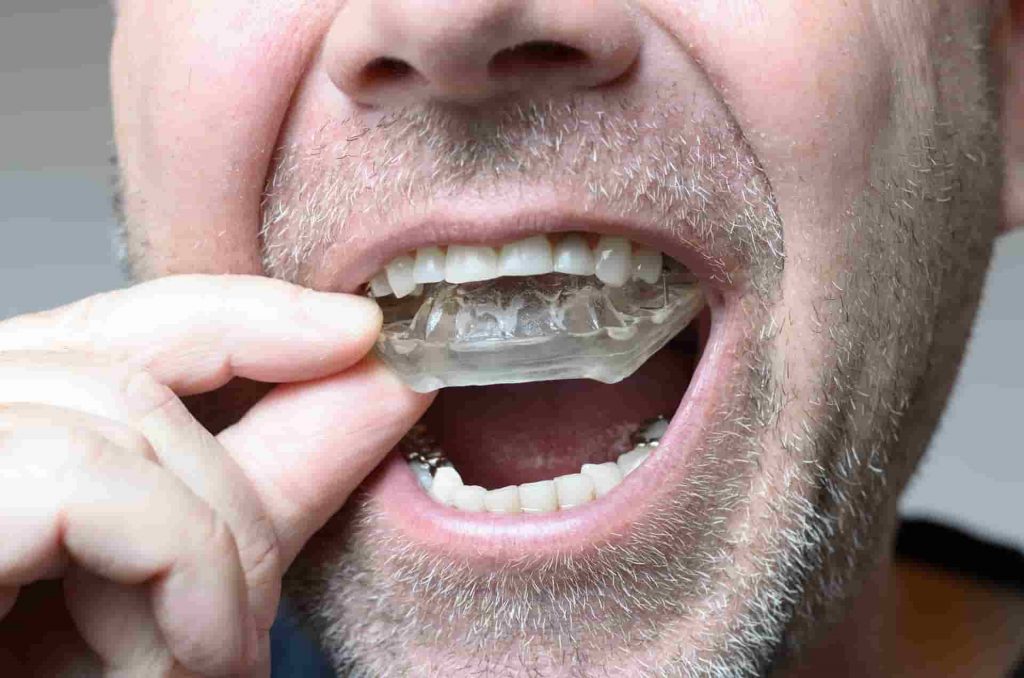
A night guard is a protective plastic device that’ll act as a barrier between the surfaces of your teeth. So, while you’re sleeping, it’ll essentially protect your teeth from excessive clenching and grinding.
However, to further understand how to stop bruxism at night, you must consult a medical professional.
How To Avoid Bruxism?
It may be possible for you to avoid bruxism by:
- Wearing protective dental appliances
- Managing your stress
- Limiting your intake of coffee and alcohol
- Avoiding smoking
- Getting regular dental checkups
Also if you’re already struggling with the pain from bruxism, ice packs might be able to help you. To prevent this from worsening, you shouldn’t chew any gums or eat hard foods, either.
Conclusion
Bruxism can be a very problematic habit if it’s severe. It can have very serious consequences for your oral health, where both your natural and artificial teeth can suffer. The pain from it can also radiate to other parts of your body.
And if it causes other health problems, it can almost feel like it’s spiralling out of control. However, there are different ways in which this can be managed. Oral devices can help, and so can therapy (or meds if needed).
But you shouldn’t underestimate the power of a healthy lifestyle. Both your diet and daily stressors can impact this habit of yours.
So, if you’re struggling to deal with it, it’s a good idea to seek professional help at a dental clinic in Turkey before it ends up causing irreversible damage.
Reviewed and approved by Dr Izbel Aksit
FAQ
Can bruxism be cured?
Bruxism may go away as you grow older and older, and you might not even need treatment for it. However, you should still consult a medical doctor.
Can bruxism be reversed?
Bruxism can cause irreversible damage to your teeth. For instance, if the enamel of your teeth is severely worn, it won’t be restored. Any fractures won’t be undone, either. So, if you have a problem, don’t delay treatment.
Can bruxism cause bleeding gums?
Bruxism can cause gum recession, and that may, in turn, cause bleeding, among other symptoms.
Can botox help bruxism?
Some research indicates that Botox is effective for bruxism. But keep in mind that this treatment might not be covered by the NHS or private insurance. However, you can get masseter botox in Turkey at an affordable price.
What is nighttime bruxism?
Nighttime bruxism may refer to the kind of teeth grinding that occurs while you’re sleeping at night. But it’s less about the time of day and more about sleeping itself. You can have bruxism even when you sleep during the day.
Does bruxism from SSRIs go away?
Bruxism caused by SSRIs (serotonin reuptake inhibitors) may resolve in 3-4 weeks after the drug is discontinued, replaced or there’s an addition of an anxiolytic agent, according to a study published in the Neurology Clinical Practice.
Can braces fix bruxism?
If malocclusion is what’s causing bruxism (this idea is controversial), getting braces to fix it might help. But you should further consult your dentist about this.
